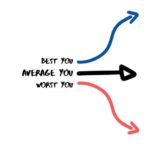A couple months back while I was living in Peru I had my passport stolen. It was one of those regretfully stupid moments where I let my guard down and naively forgot I was out in the public place. Funny enough just a few days before it happened I had been wondering what the recovery process for when you lose your passport while travelling was. Turns out you just go to your embassy and fill out some paperwork to get a temporary travel document.
Side note: The Canadian Embassy in Peru does not have Mounties waiting to greet you at the door. I know I was pretty upset about it too.

In the moments and weeks that followed the incident, a continuous line of thoughts ran through my head. “What if I had just kept my bag beside me?” “What if I didn’t have my passport with me that day?” What if I left my passport back in my other bag at the hotel?”. All of these “what if” questions and “If only” thoughts were just bombarding me.
But for what purpose? Why are we so drawn to dwelling on the past and focusing in on negative life experiences?
In psychology there is actually a term for this, it’s called Counterfactual Thinking, and it perfectly sums up why we go through this seemingly endless pattern of thought. Essentially, it’s the human tendency to create possible alternatives to life events that have already occurred; something that is contrary to what actually happened. Counterfactual thinking is, as it states: “counter to the facts”. When we express a counterfactual, we are going against reality because we either don’t want to accept it or because we want to remember this painful moment for the future.
This type of thinking can be incredibly helpful, especially when it comes to reflecting on regretful and painful experiences. When we dwell on these “if only’s” we help ourselves see how to handle the situation better next time. It also causes us to reconsider our previous view of the world and rethink how we want to act going forward. Now I’m not saying this means I’m going to treat all Peruvians as potential thieves, but when I’m out in public, I’m going to be much more careful about where I place my belongings. I may even buy myself a nice fanny pack.
In the end, one of the greatest benefits of counterfactual thinking is that it brings the problem back to you. It gives you a chance to take ownership over your mistakes and recognize how you could do things better, and this, in turn, creates a further sense of agency over your life.

The error that I think some of us make, whether it’s reflecting on a huge costly mistake made during a game or a fender bender while driving ourselves to practice. In both instances, we have a choice, to look externally for someone else to blame or to ask ourselves “what role did I play in this mistake?”
It can be difficult to admit our mistakes, especially in the moments where it really doesn’t seem like we were at fault. But no matter what happens we can always find our role (no matter how small it might be).
Because if you’re not willing to take responsibility for your role in the problem or mistake, you won’t ever change in the future. You will forever be looking externally for others to solve your problems and help you from making mistakes, instead of you taking ownership for what you did and learning to never do it again.
Final Thoughts on Thinking
As valuable as it can be to sometimes reflect on the mistakes we’ve made that we know we can avoid in the future, it’s more important that we recognize the regular errors we are perpetuating (both big and small) that we are not taking responsibility for. These matter even more because these are the mistakes that will silently creep up from behind and hurt us the most. Don’t let these mistakes come back to haunt you.
As the old saying goes, Check Yourself Before You Wreck Yourself!
-Derek





